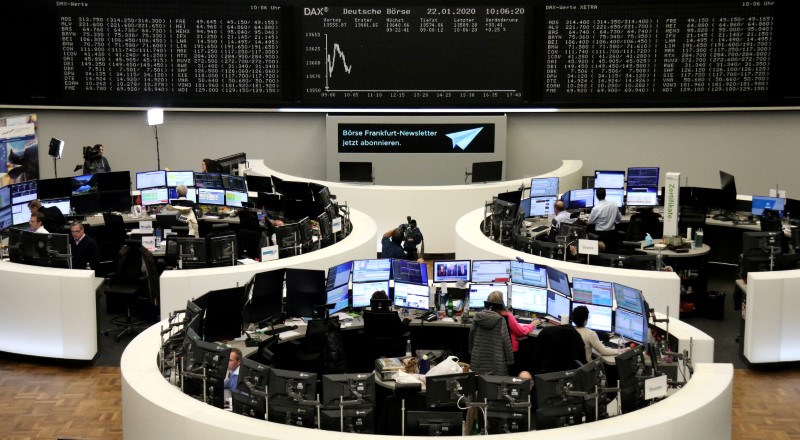By Marc Jones
LONDON (Reuters) - World stock markets looked to be getting back to full strength on Wednesday, as updates from China about the spread of a new flu-like coronavirus raised hopes the outbreak would be contained.
Worries about contagion, particularly as millions travel for upcoming Lunar New Year festivities, have knocked the world's top equity markets off record peaks.
The outbreak has revived memories of the Severe Acute Respiratory Syndrome (SARS) epidemic in 2002-03, a coronavirus outbreak that killed nearly 800 people.
This time, China's response and candour -- in contrast to the SARS epidemic -- have helped reassure investors concerned about the possible global fallout.
China's National Health Commission said on Wednesday there were 440 cases of the new virus, with nine deaths so far. Measures are now in place to minimize public gatherings in the most-affected regions.
Stocks in London, Frankfurt and Paris scored early gains of 0.1% to 0.2%. S&P 500 futures (ESc1) were up 0.5% before the Wall Street open.
Shanghai stocks (SSEC) recovered from an early 1.4% drop to end higher. Japan's Nikkei (N225), South Korea's Kospi index (KS11) and Hong Kong's Hang Seng (HSI) had all risen by more than half a percentage point overnight. Australia's S&P/ASX 200 (AXJO) shrugged off worries to hit a record high.
Italian government bond yields rose as much as 8 basis points on reports the leader of the country's 5-Star party and foreign minister, Luigi Di Maio, will step down.
It was the biggest sell-off in a month and raised the risk of another snap election in Europe's fourth-largest economy, since 5-Star is part of Italy's coalition government.
"The initial reaction was to sell because of the heightened political uncertainty," said Luca Cazzulani, a strategist at UniCredit in Milan. "But there is no outright link between de Maio's resignation and a collapse of the government."
With markets generally rising, safe plays such as gold and the Japanese yen were weaker. The dollar (DXY) was rising toward the highs it reached in December against the other top world currencies. [/FRX]
The coronavirus outbreak has spread from its origin in Wuhan, China, to the United States, Thailand, South Korea, Japan and Taiwan. The World Health Organization meets later on Wednesday to consider whether the outbreak is an international emergency.
"The call here is not that the virus is done or nipped in the bud by any means," said Kay Van-Petersen, global macro strategist at Saxo Capital Markets. "But there have been no big further reported outbreaks, and the response from the Chinese authorities has been very, very positive".
SARS FLASHBACK
Airlines, other travel-exposed stocks and retailers vulnerable to shifts in consumer sentiment have borne the brunt of selling in the past two days, along with the Chinese yuan.
MSCI's airline industry index <.dMIWO0AL00P> posted its biggest daily drop in more than three months on Tuesday. Airline shares were still falling on Wednesday.
"While details on the coronavirus are scant, we reckon that the SARS period could offer some clues as to how markets could pan out," analysts at Singapore's DBS Bank said. "The trends are clear: Yields and stock prices fell in the first few months of the SARS outbreak and rebounded thereafter."
So far, the yield on U.S. 10-year government bonds has stabilized after Tuesday's drop, sitting at 1.78% (US10YT=RR) in European trading. [US/]
Spot gold
Oil prices also settled back as traders figured a well-supplied global market would be able to absorb disruptions that have cut Libya's crude production. [O/R]

Brent crude (LCOc1) was down 0.31% at $64.39 a barrel and U.S. crude (CLc1) fell 0.43% to $58.13 a barrel.